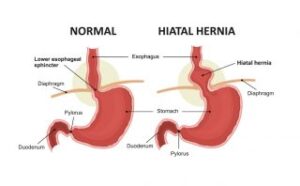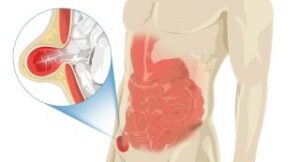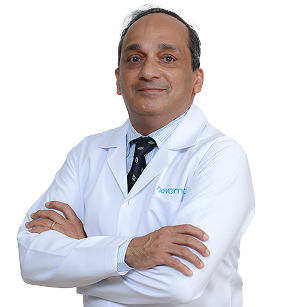What is a Hernia?
A hernia is one of the most common conditions that require surgical treatment. A hernia occurs when an organ protrudes through an opening in the tissue that holds it in place. A hernia surgery helps to relieve the pain and to return the herniated organ to its place.
Our Team of proctologists at Novomed can diagnose the type of hernia you have and develop a personalized treatment plan that suits your needs.
What are the types of Hernia?
- Inguinal (inner groin) hernia
- Incisional (resulting from an incision) hernia
- Femoral (outer groin) hernia
- Umbilical (belly button) hernia
- Hiatal (upper stomach) hernia.

Hernia Repair is not suitable for:
Those who suffer from a trapped inguinal hernia.
- Patients who can not be put under general anesthesia.
- Patients with hemorrhagic disorders such as hemophilia or idiopathic thrombocytopenic purpura (ITP).
- Patients who take anticoagulants or blood thinners.
- Patients who underwent several abdominal surgeries.
- Patients who suffer from difficult lung diseases such as emphysema. Carbon dioxide, which is used to inflate the abdominal cavity, can lead to breathing disorders.
- Pregnant women.
- Obese or overweight people.

Postoperative recovery
After hernia repair surgery, the patient can go home the same day. Swelling may begin 1-4 days after surgery and will go away within 1-2 weeks. Gentle exercise can help reducing recovery time, but the patient should avoid heavy lifting or exhausting activities for 4-6 weeks after the surgery.
What could cause a Hernia?
Inguinal and femoral hernias usually occur due to muscle weakness that may be present from birth and are also associated with aging and frequent strain on the abdomen and groin areas. This strain may be the result of physical activity, obesity, pregnancy, frequent coughing, or straining on the toilet due to constipation.
Adults may develop an umbilical hernia by straining the abdomen, gaining weight, or giving birth.
The cause of a hiatal hernia is not fully clear, but the weakening of the diaphragm with age or pressure on the abdomen can play a role.
What are the symptoms of a Hernia?
- A bulge or swelling in the groin that increases over time
- Elevated pain at the site of the bulge
- Pain upon lifting heavy objects
- Mild painful sensation
- Feeling full or signs of a bowel obstruction
- Hiatal hernia is not accompanied with bulges or swelling. Instead, symptoms may include indigestion, difficulty swallowing, chest pain, and heartburn.
What are the risks of a Hernia Repair Surgery?
Hernia repair is usually very safe. But like all surgeries, it comes with several potential complications. They include:
- Wound infection
- Blood clots: They can develop because you are under anesthesia and do not move for a long period.
- Pain: In most cases, the area will be sore while healing. But some people develop chronic, long-term pain after surgery for a femoral hernia.
- Recurrence: The hernia can return after surgery
How to prepare for Hernia Repair Surgery?
Before surgery, make sure to follow any pre-appointment restrictions your hernia treatment team sets, such as avoiding anti-inflammatory drugs (painkillers) such as aspirin and ibuprofen for the week before surgery and not eating the day of surgery. Try to sleep well at night, and if your procedure requires a hospital, make sure to bring anything you need during that time.
What happens during a Hernia Repair Surgery?
Hernia repair surgery is very similar to other laparoscopic surgical procedures. The patient is completely anesthetized, and a small incision is made in the area under the navel or in the navel itself. The carbon dioxide is then introduced into the abdominal cavity until it swells, allowing the doctor to see the internal organs in the abdominal cavity.
Through a small incision, a tube-shaped device with a lamp at its tip, called a laparoscope, will be inserted, and another device that will be used to repair the hernia is inserted through another incision located in the lower abdomen. Also, the abdominal wall is reinforced and strengthened by a mesh-shaped compression belt.
Book your appointment in Novomed today!
To book an appointment with one of our board-certified colorectal surgeons in Dubai, Abu Dhabi or Al Ain or to know more about hernia repair, call us toll-free on 8006686 or click the live chat icon at the bottom of the screen.


























